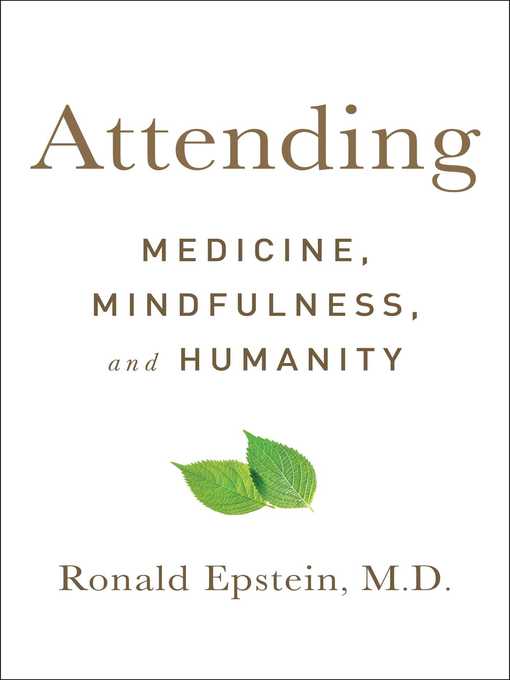
Attending
Medicine, Mindfulness, and Humanity
کتاب های مرتبط
- اطلاعات
- نقد و بررسی
- دیدگاه کاربران
نقد و بررسی

December 19, 2016
Epstein, a family physician and professor at the University of Rochester School of Medicine and Dentistry, expands on his landmark 1999 essay in the Journal of the American Medical Association, which called for “mindful practice” on the part of physicians. Here he makes the case for using mindful practice to save both a
medical profession “in crisis” and patients who are falling victim to “the fragmentation of the health care system.” Citing examples from his own practice, Epstein shows how taking time to pay attention to patients can lead to better outcomes on both sides of the stethoscope. He writes of one woman whose deteriorating health left him feeling helpless; after her recovery, she confessed that his uncertainty was reassuring: “ ‘At least,’ she said, ‘I knew you were being honest.’ ” Being mindful, Epstein states, is “a moral choice” for physicians. He also condemns the health care system and a culture of medicine that puts “clinicians in morally compromising situations” with electronic health record systems that are “sculpted around billing rather than good patient care,” and increased pressure on doctors “to see more patients without regard to quality.” Epstein’s treatise should be required reading for physicians, and it is also of vital interest to the patients in their care.

December 15, 2016
Can the encounter between doctor and patient be improved? A renowned family physician thinks so, and he explains how in this compendium of a lifetime of experience. In chapters with titles like Being Mindful, Beginner's Mind, Curiosity, Being Present, and Responding to Suffering, Epstein (Family Medicine, Psychiatry and Oncology/Univ. of Rochester School of Medicine and Dentistry) reminds us that "attending" is shorthand for the chief physician in charge of a specific case, but he also emphasizes how it describes a way of being present in the moment, sensitive to the thoughts and feelings of the patient. If that patient is suffering, the doctor must show compassion but also keep in mind the importance of avoiding burnout. Epstein contrasts this kind of attending with the hurried 15-minute encounter so common today, in which the doctor pronounces a diagnosis and a prescription while turning away to another case or the computer. Taking the time to truly engage can make all the difference in arriving at the correct diagnosis, gaining trust and compliance from the patient, and, over time, becoming a master in the field. In difficult terminal cases, for example, when the doctor hears the dreaded question, "what would you do if you were me?" it means pausing, not saying anything right away, and then asking more questions to arrive at what Epstein calls a "shared mind." Much of the meaning of "attending," as the author uses it, relates to the practice of meditation, and he offers some guidance on how to concentrate attention so the mind is not distracted or wandering. But Epstein is no spiritual preacher, and this is no New Age text. The author richly illustrates his arguments with case histories and stories of near mishaps in surgeries. Worthy reading for medical students and practitioners but also applicable to other fields: artists, writers, musicians, teachers et al. can also fall into formulaic ruts and autopilot behavior and need literally to change their minds.
COPYRIGHT(2016) Kirkus Reviews, ALL RIGHTS RESERVED.

September 1, 2016
Named one of America's best doctors every year since 1998 by US News and World Report, Epstein here builds on his innovative programs in mindful practice, which originated in his noticing as a medical student the difference between perfectly competent doctors and those for whom attentiveness was a matter of course.
Copyright 2016 Library Journal, LLC Used with permission.

December 1, 2016
In 1999, Epstein published what has come to be known as a landmark article, Mindful Practice, in the Journal of the American Medical Association. This is a sequel of sorts, as Epstein discusses the qualities and habits that define truly great doctors. The secret, he has concluded, is mindfulness. Awareness of my own mind might be one of the most important tools I could have in addressing patients' needs, he explains. He learned on the job how to turn inward in order to help himself help his patients. He now shares his personal manifesto, defining and emphasizing the practice of mindful self-awareness, self-monitoring, and self-regulation, which, he believes, are the foundations of good judgment, compassion, and attentive care. Epstein discusses such topics as curiosity, intuition, and how to respond to suffering. He also addresses that most common of doctor complaints, burnout, which he contends is a national epidemic. Epstein concludes with thoughts on how to create a mindful health-care system, in this caring and optimistic view of medicine.(Reprinted with permission of Booklist, copyright 2016, American Library Association.)

























دیدگاه کاربران